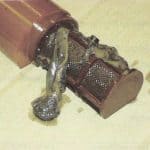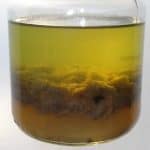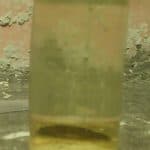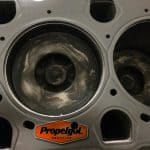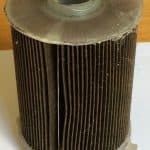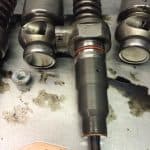Fuel information
Micro-organisms
Diesel can become contaminated with micro-organisms (bacteria). A basis for infection is established when diesel and water meet. We are talking here about free water that collects in the bottom of the fuel tank.
Bacteria can be classified into two types:
- The aerobic, producing slimy and stringy strands which will clog up the filter and cause problems. In particular, the common rail fuel systems will have these problems. Subsequently the mucoid bacteria, yeasts and fungi arise.
- Anaerobic organisms that are multicellular do not require oxygen. During their cell division the anaerobic organisms create a substance that converts the water precent in the fuel into an acid. This may cause a lot of damage to the tank and engine parts, such as corrosion.
The free water can manifest it self in different ways in a fuel tank.
The humidity in the space above the fuel condenses into droplets with temperature changes. Water can enter through not properly sealed openings. Water is heavier than fuel and collects at the bottom of the tank. This creates an interface between fuel and water to form a good breeding ground for micro-organisms. A colony bacteria will grow exponentially in this interface as the temperature rises because of returning fuel from the engine back to the tank. Only one shot glass is enough to contaminate 1,000 liters of fuel. 200 bacteria will grow in 5 hours to 16.000.000 bacteria.
Diesel standard and bacteria.
In 2004 emissions levels of sulfur in diesel were reduced to 50 ppm and in 2010 lowered to 10ppm. Therefore diesel is more sensitive to aerobic forms of contamination. The lubrication of the engine is less good due to the lower sulphur content. In 2007, regulations required that biofuel was added to regular diesel. B7 means 7% biodiesel addited. Biodiesel contains 8 times more water than regular diesel. Moreover, it contains so-called biodiesel glycerin particles. These residues are formed when the glycerin comes into contact with water, they turn into hard plastic like little pellets. Propelgol® prevents this from happening thus protecting your engine from wear and tear.
- Fuel filter filled with slime from bacteria
- Fuel contaminated with water and bacteria
- Fuel contaminated with water and sludge
Propelgol® Diesel molecules bind to the diesel molecule thereby changing the properties of the diesel fuel. Furthermore, Propelgol® Diesel increases the lubrication increases by 40% without adding sulfur. Propelgol® Diesel has been tested on 100% biodiesel without modification to the vehicle and has passed with flying colors. The cetane number has increased to 56.2 which is higher than that of Shell V-Power. the engine power has increases by 10% and the MPG will increase up to 30%.
Propelgol® reduces emissions by 95.2% and reduces carbon emissions by 38%. Propelgol® makes your diesel greener. Propelgol® is probably the only product in the world that has all problem solutions in one unified product. The worse the quality of the diesel, the better result!
FAQ
Can Propelgol® harm my engine or effect my warranty?
Absolutely not. Propelgol® has been put through over 100 000 miles of testing under all road conditions, and is used by trucking companies – several have used Propelgol® for up to two years. Propelgol® has never had a negative effect on a diesel engine and will not void any manufacturer’s warranty. Propelgol® meets the EN 590:2013 Grade E standard for commercial diesel fuel in the EU. The test for EN 590:2013 Grade E was done by Intertek in the Netherlands. The EN-590 standard is recognized and used world wide.
Will Propelgol® help with fuel storage conditions?
Yes, Propelgol® improves fuel stability in tanks mostly by reducing auto-oxidation and suspended water. European diesel that meets up to the EN590 standard has 7% biodiesel mixed in. Biodiesel contains eight times more water than normal diesel fuel. The biodiesel content of diesel will go up to at least 10% in the coming years. Water is the cause of Diesel-Pest. Through growth of bacteria in the water there is a production of slime and toxic acids that will attack the fuel system of any vehicle. Biodiesel also contains glycerine pellets that are residues from the production process and in contact with water these glycerine pellets become hard and in combination with slime they will clog the fuel-filter.
Propelgol® will prevent this from happening. The worse the quality of the diesel the better Propelgol® performs!
Good to know:
Tips from the past to winterize your diesel by putting petrol into the diesel is not the way. Modern diesel engines are lubricated by the diesel fuel, and petrol in the diesel will wash your lubriction film away from the fuel lines, pump and injectors. The result is heavily damaged parts on your diesel engine and a lot of extra cost for repairs.
- cylinder with original spray pattern Landrover Defender td5 after – 210.000km
- fuel filter Landrover Defender td5 after – 160.000km
- fuel injector Landrover Defender td5 after – 210.000km
How to recognize problems with diesel fuel:
Bad start.
No power (too little fuel)
Spontaneous shutdown (frost)
Corrosion in the fuel system
Water in the tank
Water in fuel filter
Clogging the fuel filter
Obstruction of the water separator
No fuel in the filter
Try it, you’re gonna love it!

